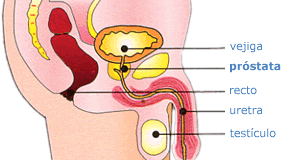The prostate is a gland exclusive to the male reproductive system, also related to the urinary apparatus. It is located at the base of the bladder, encircling the urethra like a scarf. It has the size and shape of a chestnut and weighs between 20 and 30 grams. The gland develops little until puberty, when it begins to grow rapidly. From then on, its function is to produce a milky liquid composed of chemical and organic materials and natural salts, which serve to nourish the sperms, enabling them to be active, mobile and able to fertilise the ovules.

From 50 onwards
From 50 years old onwards, the prostate slowly, but steadily, increases in volume. The benign growth of the prostate is natural and inevitable in the male ageing process.
This gland growth may produce discomfort in some people, specifically in their urinary apparatus.
In these cases, the person has repeated desire to urinate, but when he makes an effort, the stream is weaker, and he is always left with the feeling of having retained urine. If these systems occur, it is advisable to visit a urologist for a check.
In most cases, the discomfort is related to the growth of the prostate and can be resolved with the suitable treatment. In the worst of cases it is a malignant, or cancerous growth, therefore it is important to detect it before metastasis (spreading of the tumour to other organs of the body) has been produced.




























